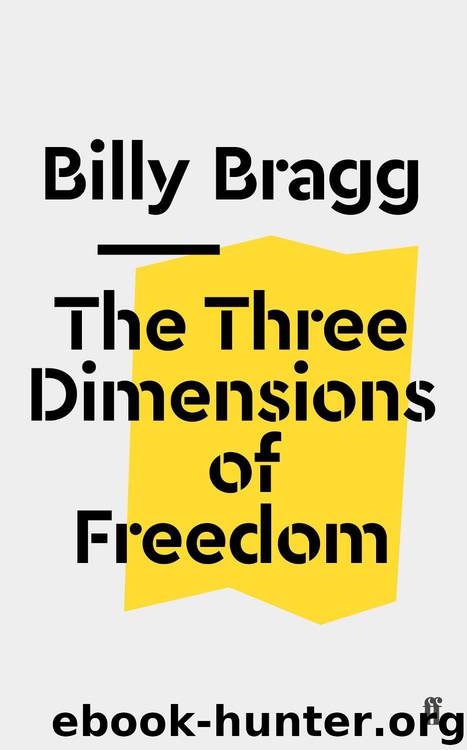The Three Dimensions of Freedom by Billy Bragg

Author:Billy Bragg [Billy Bragg]
Language: eng
Format: epub
ISBN: 9780571353231
Publisher: Faber & Faber
Published: 2019-05-20T16:00:00+00:00
3. ACCOUNTABILITY
What’s happened to that twat David Cameron who called it on? How comes he can scuttle off? … Where is the geezer? I think he should be held to account for it.
—Danny Dyer
When he quipped that the nine most terrifying words in the English language are ‘I’m from the government and I’m here to help’, Ronald Reagan was endorsing Friedrich Hayek’s one-dimensional notion of liberty as freedom from restraint. While it is true that the rules and regulations that governments introduce do create more bureaucracy, their aim is to ensure that business is conducted in an environment that is both safe for employees and customers and transparent in its practices.
In the unequal struggle between the rights of the citizen and those of corporations, the paperwork follows the power. Red tape is agency made flesh, which is why it is so often the target of neoliberal ire. From Reagan onwards, successive American presidents have dismantled legislation enacted by Franklin Roosevelt that aimed to bring greater transparency to the financial sector following the Wall Street Crash.
Roosevelt’s tight fiscal policies created the stability that led to post-war prosperity, yet by the 1990s, corporate capture of the democratic process had seen them steadily watered down. Financial transactions became opaque just as trading moved online, making it even more difficult for anyone – regulators, bankers or investors – to know what was really going on beneath the surface. As a result of deregulation, banks took on greater risks until, in 2008, the neoliberal reliance on cheap credit rather than higher wages to stimulate growth came home to roost.
The realisation that many low-income homeowners in the US were never going to repay their mortgages created a crisis in the global banking system. The ensuing chaos was so great that the Queen was moved to ask a gathering of academics at the London School of Economics why none of them had seen the crash coming. They shrugged and told her that, at every stage, someone was relying on somebody else and everyone thought they were doing the right thing. Or, to put it another way: ‘I’m from the free market and I’m not here to help.’
The 2008 crash was a crisis of accountability, not capitalism. The problems caused by the free market are systemic in nature, the result of choices that have been made. Given the right tools, we can work together to make better choices, ones that benefit the whole of society and not just those whose lofty position in the power structure is based on their immense wealth. In terms of its relationship to human agency, capitalism is like fire: keep it under control and it will give you heat and light; leave it untended and it will consume everything in its path.
Throughout history, crises of accountability have been the catalysts for advances in individual agency. The Magna Carta, drawn up in thirteenth-century England as a counter to the absolute power of the monarchy, evolved over several decades into a bill of rights that went on to shape law on both sides of the Atlantic.
Download
This site does not store any files on its server. We only index and link to content provided by other sites. Please contact the content providers to delete copyright contents if any and email us, we'll remove relevant links or contents immediately.
| Diaries & Journals | Essays |
| Letters | Speeches |
The Rules Do Not Apply by Ariel Levy(4946)
Bluets by Maggie Nelson(4541)
Too Much and Not the Mood by Durga Chew-Bose(4324)
Pre-Suasion: A Revolutionary Way to Influence and Persuade by Robert Cialdini(4203)
The Motorcycle Diaries by Ernesto Che Guevara(4078)
Walking by Henry David Thoreau(3946)
Schaum's Quick Guide to Writing Great Short Stories by Margaret Lucke(3368)
What If This Were Enough? by Heather Havrilesky(3300)
The Daily Stoic by Holiday Ryan & Hanselman Stephen(3292)
The Day I Stopped Drinking Milk by Sudha Murty(3183)
The Social Psychology of Inequality by Unknown(3011)
Why I Write by George Orwell(2941)
Letters From a Stoic by Seneca(2783)
A Short History of Nearly Everything by Bryson Bill(2679)
A Burst of Light by Audre Lorde(2586)
Insomniac City by Bill Hayes(2535)
Feel Free by Zadie Smith(2472)
Upstream by Mary Oliver(2382)
Miami by Joan Didion(2362)
